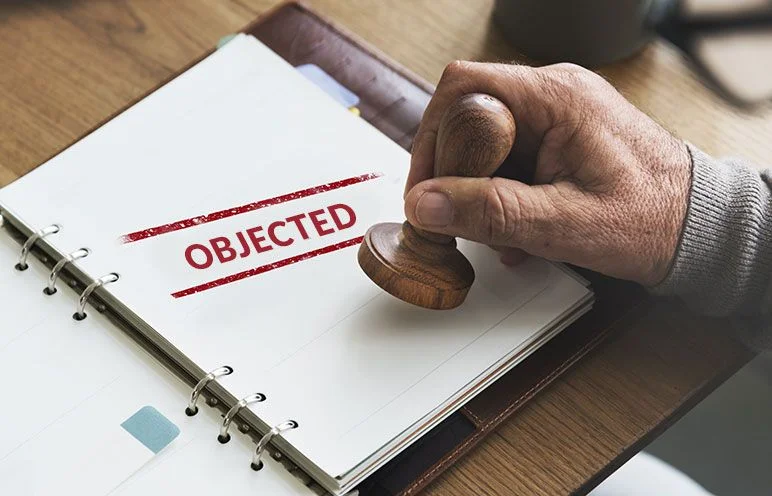A trademark objection is a formal refusal issued by the trademark registry during the TM application process. It highlights issues with the application that may prevent the trademark from being registered. Trademark objections are common, and understanding how to address them is essential to ensure smooth registration.
Understanding how to navigate these challenges can enhance your chances of successfully securing a trademark. This guide delves into what trademark objections are, the difference between objections and opposition, and how a trademark attorney can assist you throughout the process, alongside relevant sections from the Trademark Act.
What is a Trademark Objection?
A trademark objection is a preliminary hurdle in the trademark registration process. This typically occurs during the examination stage, when the Registrar of Trademarks identifies issues with the application under the Trademark Act, 1999. Commonly cited sections under the Act include:
- Similarity to Existing Trademarks: If your proposed trademark resembles a registered or pending trademark application, it may cause confusion among consumers. Section 11(1) of the Trademark Act, 1999, states that a trademark shall not be registered if it is identical or similar to an existing trademark for the same or similar goods or services.
- Descriptive Marks: Trademarks that merely describe the goods or services being offered often face objections. Under Section 9(1)(b) of the Trademark Act, a trademark is not registrable if it consists exclusively of signs or indications that may serve in trade to designate the kind, quality, quantity, intended purpose, value, geographic origin, or the time of production of the goods.
- Generic Terms: Commonly used terms in your industry typically cannot be registered. For example, a trademark like “Bread” for a bakery would likely be denied registration.
- Misleading Information: Providing false or misleading information in your application can result in rejection under Section 31 of the Trademark Act, which deals with the consequences of making false statements.
- Violation of Public Policy: Trademarks deemed offensive or contrary to public interest may also be denied. For instance, marks that are scandalous or immoral are not registrable.
Difference Between Trademark Objection and Trademark Opposition
Understanding the difference between trademark objections and trademark opposition is crucial for navigating the trademark registration process:
Trademark Objection
- Definition: A trademark objection is raised by the Registrar of Trademarks during the examination of the application.
- Nature: This is an administrative hurdle, usually arising from concerns about the application itself, such as its similarity to existing marks or its descriptiveness.
- Resolution: The applicant can respond to the objection by addressing the Registrar’s concerns, providing evidence to support their application, or amending the application if necessary.
Trademark Opposition
- Definition: A trademark opposition occurs after the trademark has been published in the Trademark Journal, where third parties can oppose the registration.
- Nature: This is a legal challenge initiated by a third party who believes that the registration of the trademark may cause confusion or harm to their interests.
- Resolution: The opposition process involves legal proceedings, where both parties present their cases. A decision is then made by the trademark office based on the arguments and evidence provided.

Common Errors Leading to Trademark Objections
Some common mistakes can lead to objections during the trademark application process:
- Using Generic or Descriptive Terms: Avoid names that directly describe your products or services, as these are often rejected.
- Inadequate Distinctiveness: Ensure your trademark is distinctive enough to stand out. Marks that are too similar to existing trademarks are likely to face objections.
- Poor Logo Design: A confusing or poorly designed logo can misrepresent your brand and lead to objections.
- Incomplete Application: Ensure all necessary details and documentation are included in your application. Missing information can result in delays or rejections.
- Lack of Trademark Search: Failing to conduct a comprehensive trademark search before filing can lead to objections based on prior registrations.
Steps to Avoid Trademark Objection
Avoiding an objection begins with thorough preparation and due diligence before submitting a trademark application.
1. Conduct a Comprehensive Trademark Search
A trademark search is the first and most important step. Searching helps identify any existing marks similar to your proposed mark. The Controller General of Patents, Designs & Trade Marks offers online resources for preliminary searches.
2. Choose a Unique Brand Name
Generic or descriptive terms often lead to objections. Consider a brand name that reflects the brand’s identity while avoiding common industry terms. Using coined or invented words can increase distinctiveness and reduce the chance of objections.
3. Avoid Duplicate Business Names
Selecting a name too similar to an existing business may lead to confusion. Using unique phonetics, spelling variations, or a distinctive design can also help differentiate the brand.
4. Pay Attention to Logo Design
Avoid creating logos that resemble well-known trademarks. Simplicity and originality are key to ensuring your logo aligns with trademark requirements.
5. Seek Assistance from a Trademark Attorney
A trademark attorney provides professional guidance, from filing the application to handling objections or oppositions. Their knowledge of trademark laws helps avoid errors that might trigger objections.
How to Respond to a Trademark Objection?
If your trademark application receives an objection, you must respond within 30 days of receiving the examination report.
1. Analyze the Grounds of Objection
Each objection is based on specific sections of the Trademark Act. Identifying the grounds for objection is crucial to building an appropriate response.
2. Draft a Well-Structured Reply
Address each objection in detail, clearly explaining the distinctive aspects of your mark. Use examples, documents, or proofs that support the uniqueness of your brand.
3. Attach Supporting Documents
If required, provide additional documents such as business registrations, domain ownership proofs, or product labels that may support your case.
4. Attend the Hearing (if required)
The Registrar may call for a hearing if the written response fails to address the objections adequately. Ensure that your attorney accompanies you for better representation.
How a Trademark Attorney Can Help
Navigating objections and oppositions can be challenging without legal expertise. A trademark attorney provides several key services:
- Conducting Preliminary Searches: Ensures your mark does not conflict with existing trademarks.
- Drafting Applications: A trademark attorney can ensure that your application is drafted correctly and submitted with all necessary documentation. This minimizes errors that could lead to objections or rejections.
- Responding to Objections: if you do receive an objection, a trademark attorney can draft a formal response addressing the Registrar’s concerns. They can provide legal arguments and evidence to support your case, improving your chances of overcoming the objection.
- Handling Oppositions: Should your trademark face opposition after publication, a trademark attorney can represent you in legal proceedings. They can prepare your case, gather evidence, and argue on your behalf, increasing your chances of success.
- Providing Strategic Guidance: Helps choose distinctive brand elements, names, and logos that align with trademark laws.
- Compliance with Trademark Laws: A trademark attorney helps you understand and comply with the legal requirements set forth in the Trademark Act, ensuring that your trademark remains protected and enforceable.
Attorneys also assist in understanding complex legal provisions, such as Section 9 and Section 11 of the Trademark Act, which frequently serve as grounds for objections.
The Importance of Trademark Search Before Filing
A comprehensive search uncovers existing marks that might cause conflicts, providing applicants with a clearer path toward registration. It involves checking government databases and may require third-party services.
Tips to Avoid Trademark Objection
- Conduct a Trademark Search: Analyze both word and logo trademarks.
- Select a Distinctive Brand Name: Avoid descriptive terms that lack uniqueness.
- Design a Unique Logo: Ensure originality and simplicity in logo design.
- Seek Professional Advice: A trademark attorney can help prevent common errors.
- Be Aware of Trademark Act Sections: Knowing the key sections can guide you in avoiding grounds for objection.
Conclusion
The trademark registration process may seem daunting, especially with the potential for objections and opposition. By taking preventive steps—such as conducting a thorough trademark search, choosing a unique brand name, and working with a skilled trademark attorney—you can avoid common pitfalls and increase the likelihood of approval.
A trademark attorney’s support is invaluable, as they ensure adherence to legal requirements and resolve objections or oppositions professionally. Following these guidelines can help establish a strong, objection-free trademark that effectively represents your brand and secures your intellectual property rights.






